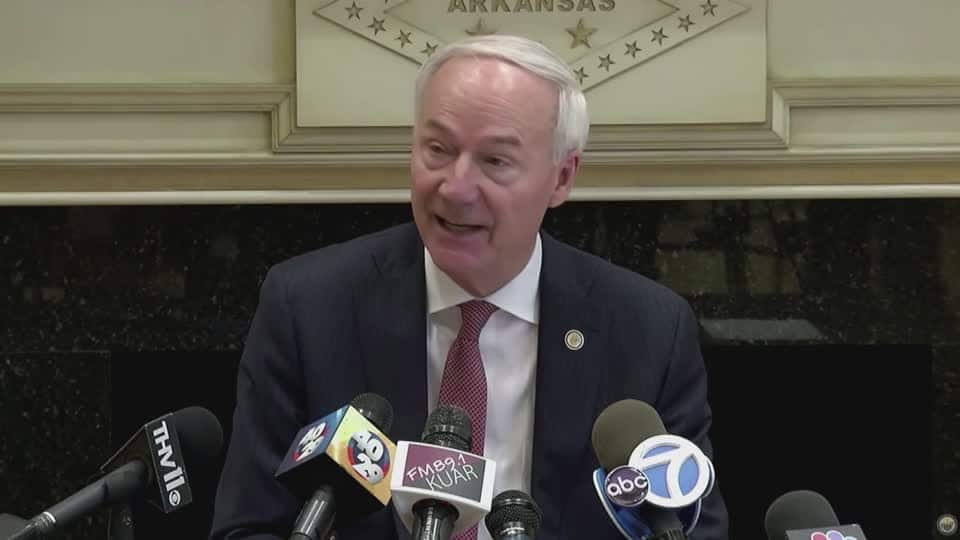Asa Hutchinson and the conservative case for caution on transgender restrictions

But while Noem, an aspiring potential 2024 presidential candidate, tried hard to walk a fine line, citing unwinnable and costly litigation, Hutchinson offered a more novel approach for his party: making a principled conservative argument against the legislation.
The episode crystallizes the emerging choice conservatives face as GOP legislators push these bills in a country that has been steadily moving in favor of LGBTQ rights. It also solidifies Hutchinson as one of the most subtly interesting governors in the country.
Hutchinson has walked a somewhat fine line on this issue, too, saying that he supports prohibiting sexual reassignment surgery for children. But after the state legislature moved to more broadly ban that as well as puberty blockers, hormone therapies and doctors referring children for such treatments — becoming the first state to do so — he made it clear that he thinks the government and his party should be more careful about getting involved in such issues.
“While in some instances the state must act to protect life, the state should not presume to jump into the middle of every medical, human and ethical issue,” he said Monday. “This would be — and is — a vast government overreach.”
After the overwhelmingly GOP state legislature overrode his veto Tuesday and made the bill law anyway, Hutchinson went on Carlson’s airwaves and doubled down — facing an interviewer he had to know would be hostile based on Noem’s experience. He called the bill “extreme” and criticized it for getting the government involved in private health-care decisions. He particularly objected to the lack of a clause grandfathering in children who have already begun hormone treatments.
Among his other comments pressing the conservative case for his veto:
- “I go back to William Buckley, I go back to Ronald Reagan, to principles of our party, which believes in a limited role of government. Are we as a party abandoning a limited role of government and saying we’re going to invoke the government decision-making over and above physicians, over and above health care, over and above parents — and saying, you can’t do that, you cannot engage in it?”
- “Do you want to listen to the medical profession? Do you want to listen to professional counselors? Do you want to listen to parents? Or do you want to leave all these decisions to the legislators that come from all different kinds of backgrounds? Yes, they’re elected to represent you. But they do not necessarily make the right judgments for parents and for doctors in the most sensitive issues.”
- “The research that I’ve seen shows that these troubled youth, these ones that have gender dysphoria, that they also have depression, they have suicidal tendencies. It’s a higher suicide rate than others. … And they go to their parents, the parents go to doctors, and they try to deal with this very difficult issue. I don’t think we should deny them health care.”
- “I’m a person of faith. But at the same time, I’m a person of limited role of government. I sign pro-life bills. I signed many bills that would be looked at as a very conservative, but this is one that crosses the line. There’s no need for it, and it doesn’t justify itself.”
That last argument is key. Hutchinson has indeed signed numerous abortion restrictions into law since becoming governor in 2015, and he signed the most far-reaching one just a month ago. It’s a bill that experts say would ban nearly all abortions in the state and could force the Supreme Court to take up the issue. His social conservative bona fides are difficult to dispute.
But even in signing that abortion bill, he raised concerns about the legality of the law and its lack of exemptions for rape and incest. And there have been a handful of other episodes in which he has seemingly tried to guide his party in ways that went against the grain of the most passionate portions of the base.
None of these were the positions of moderates, necessarily, but in a Southern state they were significant moves.
Nor did any of them propel Hutchinson into the national spotlight. But through a confluence of circumstances — most notably Arkansas’s early push to ban children from receiving gender-affirming treatments — Hutchinson is making a conspicuous decision to lean into a limited-government argument for caution on transgender bills.
It obviously wasn’t compelling to GOP state legislators, who essentially matched their previous overwhelming majorities for the bill in overriding the veto. But his stand in the face of an expected veto override and then his decision to press the issue to conservative viewers on Fox News is a significant development in a debate about transgender rights that is quickly ramping up in states nationwide.






